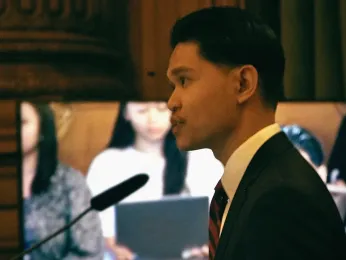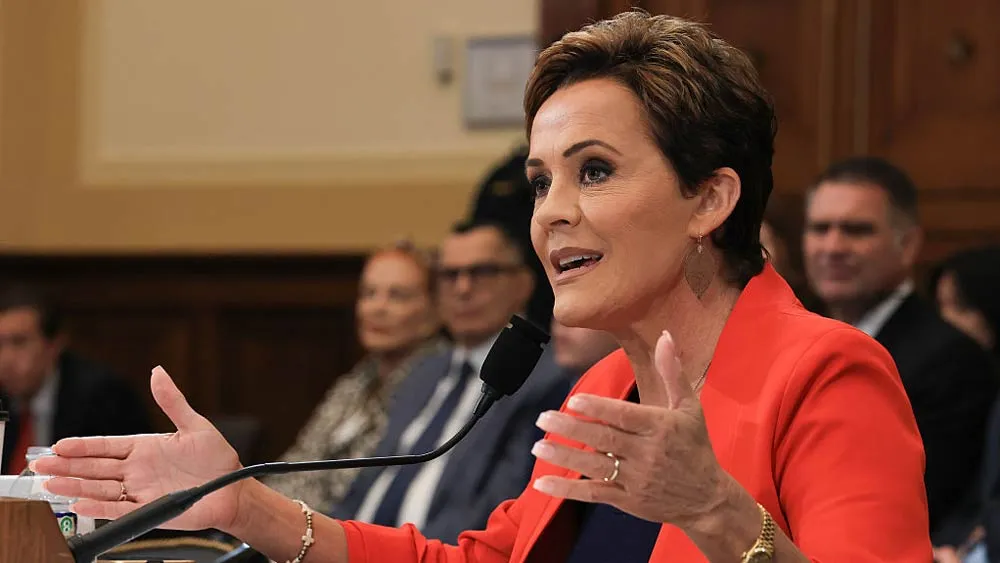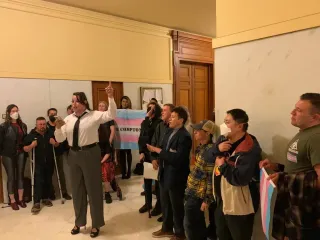
8 hours ago
As family mourns father’s death, SF supe calls for hearing on reentry site
Eliot Faine READ TIME: 6 MIN.
San Francisco Supervisor Bilal Mahmood has called for a hearing into the GEO Group and its reentry site at 111 Taylor Street after Melvin Bulauan, a resident who had been housed there, died on the same street as the facility. News of his death came the day after the San Francisco Board of Appeals upheld the legal use of the facility , allowing the company to continue operating at the site.
The facility is currently used as a halfway house, advertising reentry services for formerly incarcerated people. GEO contracts with Immigration Customs and Enforcement and the state of California, and has operated the site for 36 years.
Fifty-eight years ago, 111 Taylor Street was the location of Gene Compton’s Cafeteria, where trans and drag patrons staged a protest against police in August 1966, three years prior to the Stonewall riots in New York City that marked the birth of the modern LGBTQ rights movement. Trans activists had filed an appeal seeking to end GEO Group’s presence in the building.
At the July 22 Board of Supervisors meeting, Mahmood explained he plans to subpoena representatives from GEO Group and other officials to testify at the hearing, which is expected to be held in the fall.
Bulauan was transferred from a state mental health facility in Atascadero to 111 Taylor Street on July 13. His family received a call from him on the same day. Anjru Jaezon de Leon, Bulauan’s son, spoke during public comment at the supervisors’ meeting and described his father’s voice cracking and his shallow breath as he said he’d “rather go back to jail than stay” at the facility.
On July 14, Bulauan would have turned 45 years old. Instead, one of his daughters received a call from the Office of the Chief Medical Examiner.
According to the family, around 3:30 that morning, Bulauan had been found dead at 225 Taylor Street.
“Just one block away from where he said he was too afraid to sleep,” de Leon said during public comment at the board meeting.
The medical examiner’s office would not release information over the phone as the case is still open. The Bay Area Reporter sent an email with questions and is waiting for a response.
Mahmood’s hearing request comes after last Wednesday’s Board of Appeals decision to uphold the legal use of the building, despite hearing from Mahmood and over 60 community members who spoke of their concerns of the alleged negligent and abusive conditions at the reentry facility.
GEO Care’s Vice President of Communications Monica Hook stated via email that the company was not taking questions regarding Bulauan’s death, but provided the following statement.
"We, like everyone, regret hearing the news of someone losing their life. However, the information contained in the referenced press release indicating Mr. Bulauan died at the Taylor Street Center is categorically false,” the email reads.
In the July 22 release from Mahmood’s office, the headline states, “...following the death of Melvin Bulauan at 111 Taylor Street facility.”
Jessica Gutierrez Garcia, an aide to the supervisor, told the B.A.R. July 23 that Mahmood clarified at the meeting that Bulauan died “under their [GEO Group’s] care” but outside the facility.
Furthermore, according to the statement from Hook, Bulauan left the facility without authorization on July 13. He was reported and discharged by GEO’s Taylor Street Center. The center was notified on July 15 that Bulauan had died, and they have no additional information.
Mahmood’s release noted that after receiving word of Bulauan’s death, his family contacted their father’s parole officer at GEO Group, who claimed they had no knowledge that Bulauan had left the facility.
Mahmood stated that he wanted the hearing to look into the conditions of 111 Taylor Street “and the ongoing role of GEO Group in San Francisco.”
“It takes great courage and strength to turn pain into action and advocacy,” Mahmood said, addressing both the cultural significance to the trans community and Bulauan’s own children, who reported their father’s death at the Reentry Council of the City and County of San Francisco meeting July 17 and were present at the supervisors’ meeting.
De Leon said during public comment at the meeting Tuesday that he called the reentry facility three times to beg for a wellness check on his father, and three times he was hung up on before he had the chance.
“Not only do we have to grieve our father’s death, but we must now seek answers on his behalf,” he said.
Bulauan moved from the Philippines to San Francisco at 11 years old, Mahmood shared from his request to adjourn the meeting in memory of Bulauan. According to his family, he was a track star in middle and high school, remembered for his humor, diligence, and curiosity.
Historic building
The ground floor commercial space at 111 Taylor Street had housed Gene Compton’s Cafeteria, where one night in August 1966, a drag queen reportedly threw a cup of hot coffee in the face of a police officer who tried to arrest her without a warrant. While the exact date of the altercation has been lost to time, the incident sparked a riot between trans and queer patrons of the 24-hour diner and cops, as detailed in the 2005 documentary "Screaming Queens" by transgender scholar and historian Susan Stryker, Ph.D.
The property earlier this year became the first granted federal landmark status specifically for its connection to the transgender movement in the U.S. It is also now on the California Register of Historical Resources.
In 2022, San Francisco officials had landmarked the intersection of Turk and Taylor in front of the building in recognition of the uprising by the LGBTQ Compton’s patrons. The city's 307th landmark also included portions of the structure's exterior walls containing the commercial space that had housed the Compton’s eatery on both the Turk and Taylor street facades.
An effort to reclaim the building is led by activists, residents, historians, and scholars as the Compton’s x Coalition .
“Our number one goal is to get folks that are currently in that space into programs and connected to resources that will actually help them achieve reentry. [...] We have a group of organizers who have curated a very beautiful, human-first, respect-first plan to support people who are incarcerated in 111 Taylor. To get them back into their communities, to get them back into their homes,” Santana Tapia, spokeswoman for the Coalition, told the B.A.R.
Tapia was present at both the Board of Appeals meeting July 16 and this week’s Board of Supervisors meeting.
Bulauan’s family has started a crowdfunding campaign to pay for his funeral services. As of July 23, it’s raised almost $24,500 of its $28,000 goal.
“As an immigrant and person of color in a city of contrasts, our father faced real obstacles both personal and systemic. He lived with bipolar disorder, depression, and schizophrenia, and he struggled for decades with substance use. He was human,” his family writes in the description of the online fundraising appeal.
“These were not just private battles. They were compounded by a cycle of incarceration and institutionalization, often worsened by the failure of the systems meant to support people like him, systems that too often punish instead of heal,” noted the family.
Tapia said the Compton’s x Coalition wants dignity for everyone, explaining the intersectional conversation between trans activists and incarcerated people and the overlap between the two.
“We understand that this fight for liberation is about asking for human decency for everyone. It doesn’t matter if you’re coming from the carceral system, wherever you are in life, everyone deserves decency. ... And I think that speaks to the beauty and power of our trans community. We get the chance and the privilege every day to achieve our fullest selves. Why shouldn’t someone else be able to achieve that?” Tapia told the B.A.R. after the supervisors’ meeting.
In addition to officials from GEO Group, Mahmood plans to call representatives from the San Francisco Public Defender’s Office, the Adult Probation Department, and the California Department of Corrections and Rehabilitation to provide expert testimony at the hearing, according to the release from his office.




